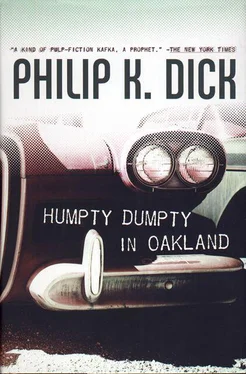“I guess you don’t want to go too high,” Mrs. Lane said. “As far as rental costs.”
“No,” he agreed.
“I could drive you around to that location on Telegraph,” Mrs. Lane said. “You could take a look at it.”
“I don’t need it right away,” he said. “I have around two months. There’s no rush. I want to be sure I get something good.”
“Yes, that’s the important thing,” Mrs. Lane said.
“The used-car business doesn’t pay very good,” he said.
“Must be like the real-estate business,” Mrs. Lane said, with a smile.
Maybe so, Al thought. We’re both in the same boat. Or maybe I’m doing you an injustice, putting you with me. Placing you down at such a hopeless point. A personable woman like you. What would you be if you had been born white? County chairman of the Republican party? Wife of some industrialist? And what would I be if I had been born colored? Just a jerk. Another nowhere jerk.
“Mr. Miller,” Mrs. Lane said in her smooth, deep voice, “you really look sad today.”
“I am,” he said, agreeing to that.
“Don’t look so sad,” she said. “Look on the bright side.” She went back to her desk and got, from the drawer, a set of car keys. “Why don’t I drive you over to the location I made mention of? I be glad to show it to you.”
“Maybe later,” he said.
“Why not now?”
“I don’t know,” he said, hearing himself mumble. “I have to get back to the lot.”
“You might miss out on the opportunity,” she said.
“Maybe so,” he said, feeling dulled and weighed down.
“Listen, Mr. Miller,” she said softly, leaning her bare, round, brown arms on the counter. “You got to act or you miss out. I know that one thing I learned from my years in real estate; if you want to get somewhere, you have to take advantage of the situation and move. Do you know that?” She waited, but he said nothing; he gazed down at the floor, feeling his mind too empty for any answer. “You have to do or you be done. I mean, they do you. It not wrong to be live-wire.” Her voice had a warm, gentle patience, almost a lecturing quality, a mother-lecturing quality. “You not going to hurt anybody. I think that what bother you; you afraid you do something wrong to somebody. Because you in a business where everybody say that anyhow.”
He nodded.
Mrs. Lane said, “I talk to you before and I remark to myself and Mr. Jones, who help me here. You’re a good person to work with Mr.—what his name? Mr. Fergesson. He completely honest, too. I take my car to him…” Her voice trailed off. “Well, I have my own mechanic.”
To himself, Al thought, A Negro mechanic. She wouldn’t dare take her car to Jim Fergesson, honest as he is. Because he probably wouldn’t work on her car. Maybe he would, maybe he wouldn’t. But she can’t take the chance. It isn’t worth it.
“Can I show you that location?” Mrs. Lane said, holding up her car keys.
“No,” he said. “Some other time. Thanks.”
As he left the real-estate office, he saw that she was watching him go; she watched him until the side of the building cut off his sight of her and hers of him.
Going back, he said, speaking across the threshold, “Maybe in another couple of days. When my plans are more jelled.”
Mrs. Lane smiled at him. With compassion, he thought. Compassion and understanding. He went on then. Back to his car.
He thought, She just wants to sell me something. But he knew it was more than that; not that at all, actually. What was it, then? Love, he thought. Love for him. Big, middle-aged, good-looking, light-skinned, Negro business woman, he thought. Wants to mother me, if possible. He felt depressed, and yet, at the same time, it seemed to him as if some of his burden had departed. He did not feel as bad as before. That’s a smart woman, a smart saleswoman; she knows her stuff, he thought. A real professional. I’ll be back. She knows that.
That peasant-minded, shrewd, cretin-brained old asshole Fergesson has put me here, he thought. Where I have to rely on this, on some woman feeling sorry for me. Where I have nothing else to get by on; I have no other way to survive, no system of my own. I have to appeal.to the soft side of some woman real-estate broker.
What I ought to do, he thought, is ruin his sale, screw up his sale forever; I ought to open a whorehouse on the lot and bring disgrace on that location. I ought to turn it into a—what, that a used-car lot isn’t already?
Who looks down on me? he asked himself. Everyone? Each person?
He did not feel like going back to his lot. He started up his car, driving in no particular direction; he merely drove through the downtown Oakland traffic, enjoying the feel of the car. It was a good solid old Chrysler with leather seats. The shift would not go into reverse, however, and so he had acquired it for seventy-five dollars. But still, it was a good car. Good enough for any reasonable person. A fine highway car.
As he drove along he conjured up, inside his mind, a sales presentation which would move this particular item; he dwelt on that, to keep himself occupied.
When he got back to Al’s Motor Sales he saw that the big white door of the garage was shut. The old man had closed up the garage, but not for lunch, since the Pontiac was gone. The old-fashioned cardboard sign on the doors had the hands turned so that it all read:
WILL RETURN AT 2.30
As he parked amid the cars on the lot, he saw that a second car, a nearly new Cadillac, had followed him and was parking behind him, next to his Chevrolet. He got out, and so did the driver of the Cad.
“Hello,” the man called.
Al shut the door of his car and walked toward the man. The man, in his early fifties, had on a smartly-tailored business suit, tie—the narrow fashionable type of tie—and the pointed Italian style of shoes that Al saw in the ads and uptown store-windows. The man smiled at him. He had a reasonably friendly manner. His hair was curly, gray, and although somewhat long, was strikingly cut. Al felt a little awed.
“Hi,” Al said. “How are you, today?” It was his standard greeting.
On his lot there surely was nothing to interest this well-dressed and obviously well-to-do man, who drove last year’s Cadillac. For an instant Al felt uneasy; perhaps this was a tax agent from the State, or even from the Federal Government—a host of ideas flew through his brain as he faced the man, keeping a smile of greeting on his face.
And then he recognized the man. This was one of Fergesson’s old customers. Obviously the man had brought his car around to the garage for work, and found the garage shut.
“I’m looking for Jim,” the man said, in a full, impressive voice. “I see the door’s shut, though.” He lifted his arm and looked at a wristwatch visible by the silver cuff-link. Al gazed at both the watch and the cuff-link, and a deep, perplexing yearning came up inside him. That was something he had always wanted: a good wristwatch, the kind he had seen advertised in the New Yorker.
Al said, “He’s probably picking up a part. Or maybe somebody broke down on the road. They call in to him instead of the A.A.A.”
“I can see why,” the man said.
If I had even three good cars, Al thought, I could attract customers like this. If I had anything decent to show . . . he felt gloomy, and he put his hands into his pockets, rocking back and forth on his heels and staring down at the pavement. He could think of nothing to say.
“I’ve been coming to him for four and a half years,” the man said. “For any little thing I need, even grease jobs.”
Al said, “He sold the garage.”
The man’s eyes widened. With dismay, he said, “No.”
“That’s right,” Al said. His gloom increased; he found it almost impossible to speak. So he continued rocking back and forth.
Читать дальше










